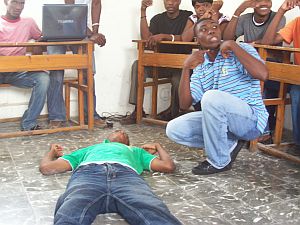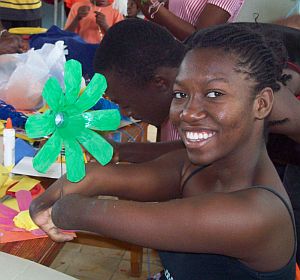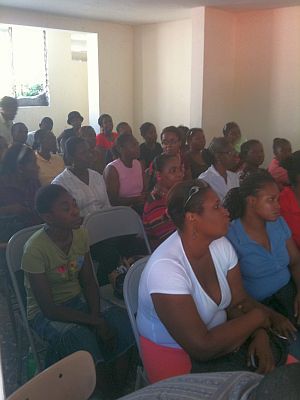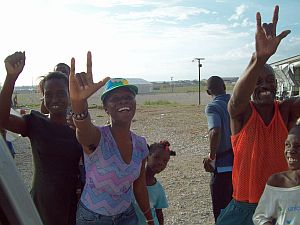|
Mission Hearts in Haiti, March 13-21, 2011
Two, from the air one could see the destruction of the earthquake of January 12, 2010. Tent cities and broken buildings, white tents and blue tarps were punctuated with piles of crushed concrete. Most visible to our team from Mission Hearts was the brightly colored wooded houses that serve as temporary housing for the deaf village. Over 300 deaf people or families with deaf members were sought out after the earthquake by Friends of Deaf Haiti as the deaf gathered dazed and displaced around the palace whose roof is still perching perilously at an angle. They were settled together in donated and makeshift tents and tarps. Now, through the deaf leadership of this camp and donations of time and money from Mission Hearts (which arose from Mission UMC, in Ft. Smith Arkansas), Healing Hands, Friends of Deaf Haiti, the Four Ten Bridge and the International Red Crescent/Red Cross, much needed medical help and food is being provided to the deaf community. The General Board of Global Ministries awarded a grant to purchase food for members of this unusual community who found themselves hungry and homeless but not hopeless. Rice and beans might not sound like much to the average North American reader, but it is life in Haiti. While it might be easy to comprehend the earthquake-damaged buildings, it is a little more difficult to comprehend the damaged lives of a people that were already the poorest nation in the Western Hemisphere. Helpless and homeless, this proud people has risen to show that they are not without hope. The Deaf community worked hard to keep their little village near the Port Au Prince airport crime free, clean and organized. Now in temporary wooden houses ,they are also building a community feeling that is awe-inspiring.
On our team were deaf role models for the deaf community in Haiti. Time and time again when a profoundly hard of hearing (considered deaf in Haiti) woman was introduced, "This is the nurse," mouths would drop open and eyes get wide with surprise. They never met a deaf nurse. They had a hard time believing it was even possible first of all for a deaf person to attain an education, let alone a deaf woman. Along with a medical clinic, a First Aid class was offered. On the second day at the deaf village, four women were trained to make paper bead jewelry. As they hone their skills, they each pledged to teach another woman so they can begin to sell this jewelry and make money for food and other necessities. One of the four deaf women was appointed as leader in that project. While one group was at the deaf camp, another part of our team was at St. Vincent’s School (for the Deaf and Deaf-blind), leading teacher workshops and encouraging their progress since the last mission visit. The earthquake took away St Vincent’s building, along with donated hearing aids, refurbished and provided by Gil Hanke, now General Secretary of the United Methodist Men. We met Joseph Jean Paul, a man born with no legs or forearms. In addition to being a marvelous painter, he is working as an encourager to the people getting prosthetics from the St. Vincent’s workshop. We stopped by New College Bird, a school at the Methodist Church, and saw the classes in session, children playing soccer, and a group doing homework under the trees. The classrooms are open style cinder block buildings with tin roofs. Kindergarten and elementary children are taught here at the school. On our third day, we traveled to Jacmel on the southern coast to visit another school called Pazapa (Step by Step) supported by Healing Hands, Mission Hearts, and other organizations. This school includes classes for developmentally delayed children and, in the afternoons, a deaf school. We assisted as teachers worked with deaf students from Kindergarten to Sixth Grade. Our second day at Jacmel at the Pazapa school, we listened to the outreach committee as they share with us their structure and plans for reaching into the mountains to find deaf children, developmentally delayed children, and other special needs children to encourage them to come to the school. Parent education plans are also in place. Working with PLAN Haiti, this school is able to accept children without charge. It costs about $200 US per school year to offer food and education to these children.
School was canceled for the day on Friday due to pending elections and the polls being set up in the area schools. That enabled us to meet with the teachers who were available for the day. They began to share their stories and challenges of teaching deaf students and developmentally delayed students, needing parents to get more involved in their deaf child’s language. Kreyol Sign Language is emerging and the Haitian people are beginning to accept signs from other countries and incorporate them into their national language. In addition to training, the school’s teachers need enrichment materials. Maps and globes, manipulative and visual materials are sorely needed. Each teacher will provide a priority list of items they need to advance their class’s education. Our mission team will strive to gather and send needed materials with the next team scheduled to come to Jacmel. Mission Hearts is returning September 2 and people wanting to join this team are invited to contact Dee Mathes, Co-Director of Mission Hearts, Incorporated, hands@pinncom.com. We discovered that there are 7 deaf schools in Haiti. The UMC has had a relationship with two of them, St.Vincent’s in Port Au Prince and Pazapa (Step by Step) in Jacmel. Investigation has begun with the deaf community in LesCayes as well, but is only in the beginning stages. Pazapa and LesCayes are not yet approved projects of the UMCOR system but we will be doing some research and trying to make them potential locations for work teams comprised of US Deaf team members within the scope of UMCOR and the Eglise Metodiste de Haiti. With support from the Deaf and Hard of Hearing Ministries committee, we hope to return to Haiti with needed materials and leadership training.
The hope and spirit of the people of Haiti and particularly the deaf community in Port Au Prince can serve as an inspiration to all of us. We can reach out to each other in hope and we can follow Jesus’ command, "Feed My Sheep" —even if it’s just rice and beans.
January 2011: UMCOR has approved a grant to the Haiti Deaf Camp which will provide assistance to 400 residents. Click here for more information about the Deaf Camp grant. A Mission Hearts team from Arkansas, Texas, Florida, and Canada will travel to Haiti in March. Click here to read about this trip The team is set, the goals have been decided, and it’s time to return! Team members come from from Arkansas, Texas, Florida, and Canada. As we prepare for our next trip we will again work with the teachers of St. Vincent and provide a well baby check. We will again return to the camp area but now the deaf have been moved in to T-Housing (temporary wood housing) and we are excited to see how the deaf are now doing in their new homes. First Aid training will be provided at the camp as well as a well baby check.
A new contact has been made: For the first time we will take a 3 hour trip from Port au Prince and travel to Jacmel, Haiti and serve at the Pazapa Center for Handicapped children which has a deaf school. Through the hard work of Karen MacKenzie-Stepner (team member and board member of Mission Hearts) will provide teachers with classroom training manuals, possibly family sign language training,work with the deaf children in the kindergarten classes and hold a well baby check.
We are honored and blessed to work and serve with this March team. Our team is a mix of deaf, hard of hearing and hearing. All have a heart to serve and we are so honored and bless to serve with each one. See our website, http://www.missionheartserves.com/. |

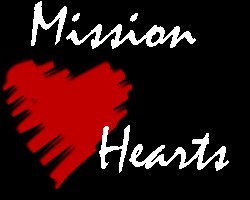 Two things were distinctly visible from the air as our plane approached Port Au Prince, Haiti.
One is the singular beauty of the western one third of the Caribbean island of Hispaniola, with its unusual shape offering miles of seacoast and green scenery. There is a saying here: "beyond the mountain…is another mountain."
Two things were distinctly visible from the air as our plane approached Port Au Prince, Haiti.
One is the singular beauty of the western one third of the Caribbean island of Hispaniola, with its unusual shape offering miles of seacoast and green scenery. There is a saying here: "beyond the mountain…is another mountain."
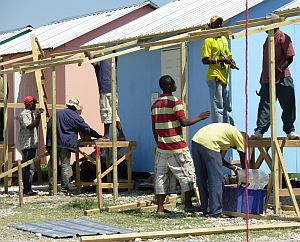 The Methodist Church of Haiti has set priorities on rebuilding lives by rebuilding schools so the children will not lose valuable education years. However, most children in the deaf community (even the hearing children) cannot afford to go to school. Jobs are few and deaf people have a doubly difficult time of finding work to feed their families and take care of their health. However, this community, the deaf village, is doing whatever they can to make life better. They pray for more help in the way of medical assistance, training and leadership development. Through the generous donation of medicines from several churches and team members, including. First UMC, Huntsville TX, team members from Ontario, Canada, and Mission Hearts organization, we were able to dispense some basic pain relievers, apply topical antibiotic, and do eye wash and ear wash procedures. They also long for a church in which to worship with communication that matches their language of signs. Haitian Sign Language is a developing language, and like the spoken language of Kreyol, (Creole) is becoming a blend of languages.
The Methodist Church of Haiti has set priorities on rebuilding lives by rebuilding schools so the children will not lose valuable education years. However, most children in the deaf community (even the hearing children) cannot afford to go to school. Jobs are few and deaf people have a doubly difficult time of finding work to feed their families and take care of their health. However, this community, the deaf village, is doing whatever they can to make life better. They pray for more help in the way of medical assistance, training and leadership development. Through the generous donation of medicines from several churches and team members, including. First UMC, Huntsville TX, team members from Ontario, Canada, and Mission Hearts organization, we were able to dispense some basic pain relievers, apply topical antibiotic, and do eye wash and ear wash procedures. They also long for a church in which to worship with communication that matches their language of signs. Haitian Sign Language is a developing language, and like the spoken language of Kreyol, (Creole) is becoming a blend of languages.
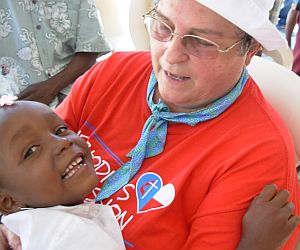 Our hope is to be able to fund future mission teams that include US deaf participants who cannot afford to pay the costs to go on this mission, but are sorely needed as role models. Gifts to Advance #982652 will help the cause of Deaf, Deaf-blind and Hard of Hearing people, both in providing funds for US deaf team members, but also funding project such as Pazapa School. The UMC Deaf and Hard of Hearing Ministries Committee has set as a priority the work in Haiti by mission teams which include deaf members.
Our hope is to be able to fund future mission teams that include US deaf participants who cannot afford to pay the costs to go on this mission, but are sorely needed as role models. Gifts to Advance #982652 will help the cause of Deaf, Deaf-blind and Hard of Hearing people, both in providing funds for US deaf team members, but also funding project such as Pazapa School. The UMC Deaf and Hard of Hearing Ministries Committee has set as a priority the work in Haiti by mission teams which include deaf members.
